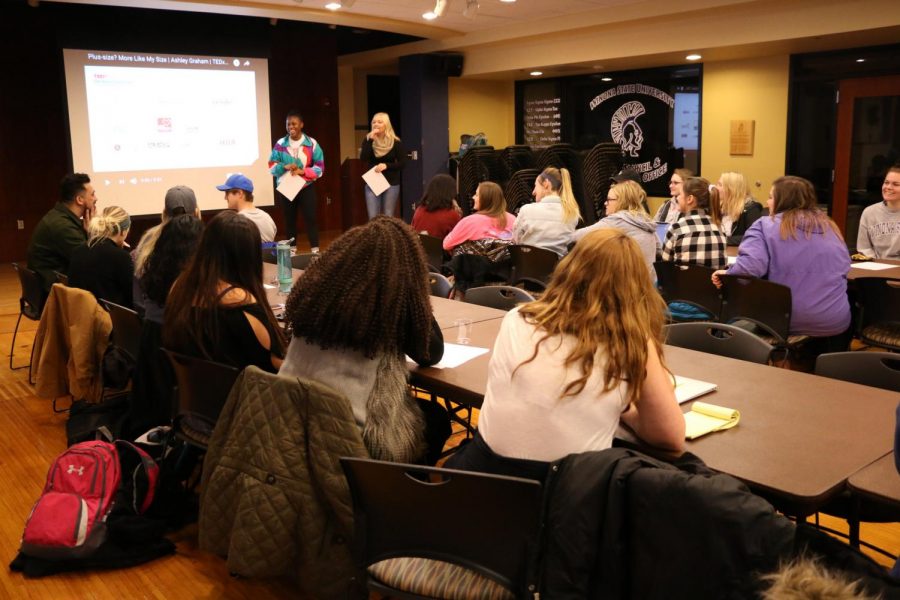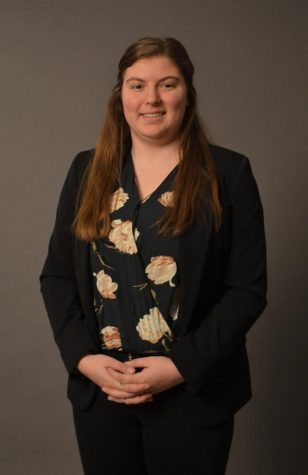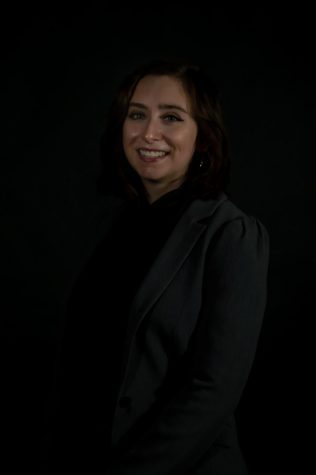Speakers, students discuss body image, positivity
Juniors Angel Tarwoe and Hallie Riedel co-facilitated a discussion following the viewing of Ashley Graham’s TED Talk on body image on Tuesday, Oct. 31. The event was part of Winona State University’s monthly TED Talk Tuesday series.
November 8, 2017
Students gathered in Kryzsko Commons’ Student Activity Center on Tuesday, Oct. 31 to view and discuss a TED Talk on body image. The event was part of Winona State University’s monthly TED Talk Tuesday series and was co-facilitated by juniors Angel Tahoe and Hallie Riesel.
The talk, titled “Plus-Size? More Like My Size,” featured plus-size model Ashley Graham who shared her experiences as a model and her struggle with body image. Graham argued that the term “plus-size” in clothing is demeaning towards people who fit within it because the term made her feel like an outsider.
Tahoe, a Spanish and global studies major, and Riesel, a public health major, selected this month’s talk because of a shared interest in body positivity.
“We both had talked previously in the past about body positivity and we just go on huge rants about different things, so we thought [this talk] was a good choice,” Tahoe said.
The co-facilitators of each month’s TED Talk typically work with Student Senate and the Office of the Vice President for Enrollment Management and Student Life to select a talk that will have relevance to Winona State students.
“I think we want to be just as relatable as possible and talk about something that’s actually affecting this community that [students] can resonate with,” Tahoe said.
After viewing the 10-minute talk, students spent the next 40 minutes discussing the issues surrounding body image. Tahoe and Riesel first asked for initial reactions before guiding the conversation with questions about beauty, ideal body types, gender-based perceptions and body image in college and on social media.
“We wanted to make sure we were hitting different points between what is beauty, or social media and how things differ for men as well, because that’s also a big issue that I think people forget about,” Riedel said.
While the majority of the students participating in the discussion were women, a couple of men were also in attendance. The students discussed how both genders feel pressured to conform to a body type that is often either physically impossible or at least highly impractical for an individual’s lifestyle.
Tahoe and Riedel then asked the students what they could do to change society’s perception of the ideal body. One student suggested that change starts with an individual’s self-perception, while another suggested that individuals need to stop viewing only one body type as beautiful.
Another student mentioned that implementing education is the key to change, an idea that Tahoe resonated with after talking to a friend post-discussion.
“I was talking to my friend and she said, ‘I would love it if in health classes we had discussions like this,’ and I thought that’s actually such a great idea because when you’re in high school everybody has to take health class and this definitely is a part of health because it affects your mental health or how you treat your body,” Tahoe said. “I feel like it really [gets] different creative juices flowing when we have conversations.”
Riedel also said that hearing everyone’s ideas in the discussion was a highlight for her.
“I think my highlight was just seeing that everyone was excited about the issue. Everyone came to the table with something to say and I think it was refreshing to see that these young people are coming together to talk about such an important issue that affects pretty much everyone, whether it’s body size or body image in general,” Riedel said. “Just seeing everyone’s thoughts turning was really awesome.”















































